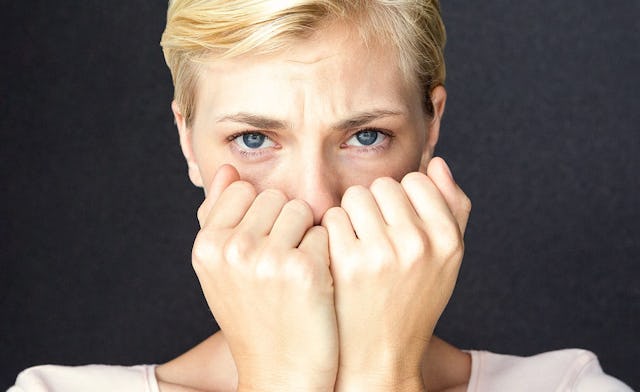I Don't Have Acne Anymore, But I Still Have The Scars

It’s so much easier to talk about acne now than it used to be. I don’t mean for people in general, I mean for me. When I was a teenager and my acne was at its peak, I couldn’t talk about it all. I was convinced that it was all people noticed about me, and if any well-meaning adult dared to bring up the subject, I was devastated.
Reading an article about the proper way to treat it reminded me of those days and the years that came after, since my acne continued all through my 20s and into my 30s. In my 30s, I met a wonderful dermatologist who finally cleared it up for me. At 49, I still get a zit here and there, usually when my period’s about to hit, but it’s nothing like it used to be, and it’s no longer preoccupying.
Acne is cruel. It’s on your face, where you can’t hide it. Makeup can conceal a whitehead or a red mark, but not a big zit, and definitely not the clusters.
Acne leaves two types of scars, physical and psychological, and they both have far too much power.
The Physical
When I was an adolescent, going to the dermatologist was like a torture session. The doctor used a sharp metal instrument to break all my zits. It was horribly painful and incredibly embarrassing, and I walked out of the office a bleeding mess. Watching people come out before me only made it worse, as the evidence of what was about to happen was written, quite literally, across their faces. Horrifying!
They don’t do that anymore. “Don’t squeeze or pop pimples, blackheads and whiteheads. This can lead to scarring,” says the article. I think they should post that on billboards across the country. I wish I’d known that then—I still bear the scars.
I went to one really crazy dermatologist who gave me a list of things I couldn’t eat, which went on for pages and pages and sucked all the joy out of life. She also told me not to use moisturizer (even though mine was oil-free), makeup (which helped smooth out my complexion, at least a little) or conditioner. I finally gave up on her whole program, because at least with conditioner, I could count on a decent head of hair.
I never went on Accutane, a drug that clears up your skin but comes with so many warnings it terrified me, but I did ultimately use a mixture of pills, prescription cleanser and over-the-counter products that worked. Dermatology has come a very long way since then: seeing a dermatologist in 2015 means you’re going to get some sound advice and helpful products.
These days they know that chocolate doesn’t cause acne, and neither does pizza, so enjoy! What I learned, to my surprise, was that iodine contributes to it, which is why dairy products can be part of the problem. Also shrimp. To this day, I get zits when I eat a lot of shrimp, but sometimes it’s worth it because I love shrimp. I also love potatoes, which are high in iodine too. Damnit.
Keeping your face clean and trying not to touch it helps. Keep your hair away from it too, which is a tough one when you’re using your hair to cover it up. And if you wear makeup and moisturizer, make sure it’s all oil-free.
The Psychological
It’s really, really hard being a teenager with acne. People make comments, whether it’s cruel strangers barking insults or adults who think they’re helping, and it’s all awful. So if you’re a parent of a child with it, watch the throwaway comments. Try not to bring up the acne in front of other people. Try to be supportive of their decisions, not chastising them for eating acne-causing foods—it stings in a way you probably can’t imagine.
When you talk to your teen about acne, make sure you’re alone. Chronic acne is a condition that doesn’t come from sloppy habits, although it can be exacerbated by them, so talk about a dermatologist, not a cleansing routine.
It’s not a tragedy—it’s just a skin problem—and while it may be something that haunts your teen, try not to act as if you think it does. It’s a bit of a juggling act, making sure you discuss it in the right environment while pretending it’s the most casual discussion in the world, but if you’ve got a teenager, you’re probably an expert in that already.
It still hasn’t gone away for me entirely. Every once in a while, I get a zit the size of California, usually on my jawline, and I feel like it arrives in places about a minute before the rest of me. I’m relieved I can joke about it, because for decades, I couldn’t. I can’t believe I’m saying this, but thank goodness for middle age.
This article was originally published on